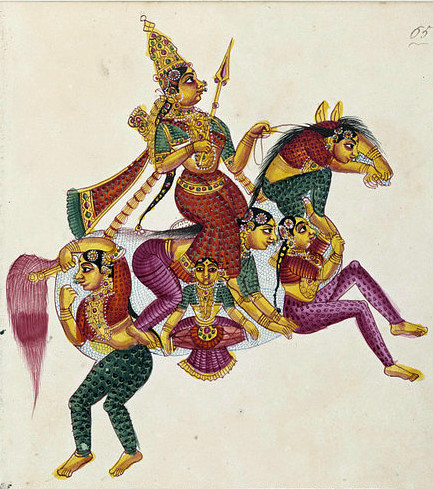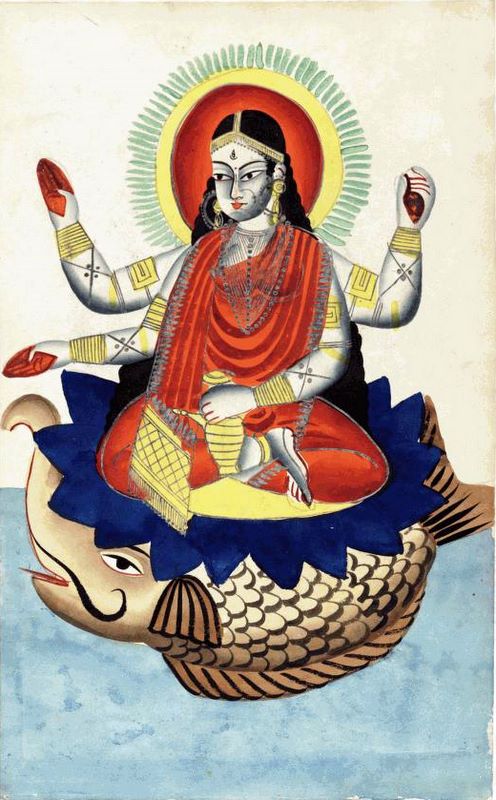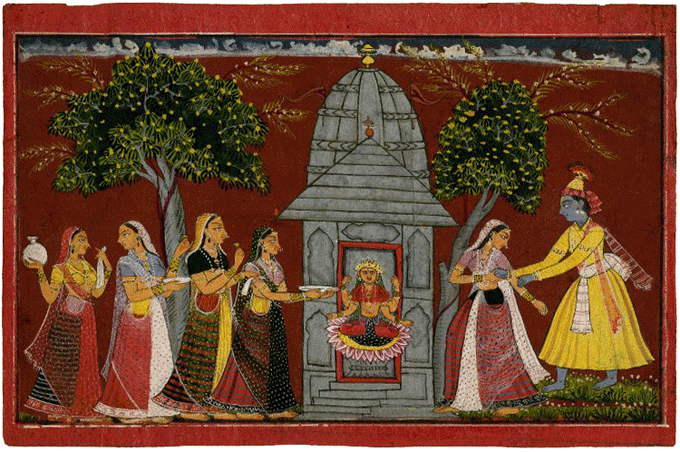|
Kamadeva
Kamadeva (, ), also known as Kama, Manmatha, and Madana is the Deva (Hinduism), Hindu god of Eroticism, erotic love, carnal desire, attraction, pleasure and beauty, as well as the personification of the concept of ''kāma''. He is depicted as a handsome young man decked with ornaments and flowers, armed with a bow of sugarcane and shooting arrows of flowers. He often portrayed alongside his consort and female counterpart, Rati. Kamadeva's origins are traced to the verses of the ''Rig Veda'' and ''Atharva Veda'', although he is better known from the stories of the Purana, ''Puranas''. The ''Atharva Veda'' regards Kamadeva as a powerful god, the wielder of the creative power of the universe, also describing him to have been "born at first, him neither the gods nor the fathers ever equaled". In the ''Puranas,'' Kamadeva is generally mentioned as a ''manasputra, manasaputra'' (mind-born son) of the creator god Brahma. His most popular myth is his incineration by the god Shiva's thi ... [...More Info...] [...Related Items...] OR: [Wikipedia] [Google] [Baidu] |
Rati
Rati (, ) is the Hinduism, Hindu Devi, goddess of List of love and lust deities, love, carnal desire, lust, passion, and sexual pleasure. Usually described as the daughter of ''Prajapati'' Daksha, Rati is the female counterpart, the chief consort and the assistant of Kamadeva, Kama (Kamadeva), the god of love. A constant companion of Kama, she is often depicted with him in legend and temple sculpture. She also enjoys worship along with Kama. The Hindu scriptures stress Rati's beauty and sensuality. They depict her as a maiden who has the power to enchant the God of Love. When the deity Shiva burns her husband to ashes, it is Rati, whose beseeching or penance, leads to the promise of Kama's resurrection. Often, this resurrection occurs when Kama is reborn as Pradyumna, the son of Krishna and Rukmini. Rati – under the name of Mayavati – plays a critical role in the upbringing of Pradyumna, who is separated from his parents at birth. She acts as his nanny, as well as his lover, ... [...More Info...] [...Related Items...] OR: [Wikipedia] [Google] [Baidu] |
Priti (goddess)
Priti (), also known as Karnotpala, is a Hindu goddess. She is one of the two consorts of the god of love, Kamadeva, along with Rati. Priti is regarded to represent affectionate love, while her co-wife, Rati, represents sensual pleasure. In other interpretations, Priti is regarded to be merely an epithet of Rati. Legend According to legend, Priti joined her father in taking up austere practices to propitiate Parvati, in the hope that she may find a suitable husband despite the fact that she was beyond her prime. Thus propitiated, the goddess appeared before Priti and prescribed her a ritual that would restore her youth and allow her to gain a husband. As Priti performed the ritual, Parvati encouraged Kamadeva to meet the newly youthful Priti, causing him to fall in love with her. When Kamadeva proposes marriage, Priti asks him to seek her father's consent. Priti weds Kamadeva to become his second consort. She is also described to be an aspect of Vishnu's divine feminine ener ... [...More Info...] [...Related Items...] OR: [Wikipedia] [Google] [Baidu] |
Pradyumna
Pradyumna () is the eldest son of the Hindu deities Krishna and his wife Rukmini. He is considered to be one of the four vyuha avatars of Vishnu. According to the Bhagavata Purana, Pradyumna was the reincarnation of Kamadeva, the god of love. The Mahabharata states that Pradyumna was a portion of Sanat Kumara. The Harivamsa describes the chaturvyuha, consisisting of the Vrishni heroes Vāsudeva, Samkarsana, Pradyumna, and Aniruddha, that would later be the basis for the Vaishnava concept of primary quadrupled expansion, or avatara. Pradyumna is also another name of the Hindu god Vishnu, mentioned to be one of the 24 Keshava Namas (names). Birth and early life Pradyumna was the son of Krishna and the sixty-first grandson of Adinarayana. His mother was Rukmini, whom Krishna had eloped with from Vidarbha during her swayamvara on her request. Pradyumna was born in Dvaraka and was the reincarnation of the demigod Kamadeva, a deity who was burnt to ashes by the fury of ... [...More Info...] [...Related Items...] OR: [Wikipedia] [Google] [Baidu] |
Kamaloka
''Kama'' (Sanskrit: काम, ) is the concept of pleasure, enjoyment and desire in Hinduism, Buddhism, Jainism, and Sikhism. It can also refer to "desire, wish, longing" in Hindu, Buddhist, Jain, and Sikh literature.Monier Williamsकाम, kāma Monier-Williams Sanskrit English Dictionary, pp 271, see 3rd column However, the term is also used in a technical sense to refer to any sensory enjoyment, emotional attraction or aesthetic pleasure experienced in connection with the arts, dance, music, painting, sculpture, and nature. In contemporary literature ''kama'' is often used to connote sexual desire and emotional longing,James Lochtefeld (2002), ''The Illustrated Encyclopedia of Hinduism'', Volume 1, Rosen Publishing, New York, , page 340. but the ancient concept is more expansive, and broadly refers to any desire, wish, passion, pleasure, or enjoyment of art and beauty, the aesthetic, enjoyment of life, affection, love and connection, and enjoyment of love with or wit ... [...More Info...] [...Related Items...] OR: [Wikipedia] [Google] [Baidu] |
Kāma
''Kama'' (Sanskrit: काम, ) is the concept of pleasure, enjoyment and desire in Hinduism, Buddhism, Jainism, and Sikhism. It can also refer to "desire, wish, longing" in Hindu texts, Hindu, Buddhist texts, Buddhist, Jain literature, Jain, and Sikh literature, Sikh literature.Monier Williamsकाम, kāma Monier-Williams Sanskrit English Dictionary, pp 271, see 3rd column However, the term is also used in a technical sense to refer to any sensory enjoyment, emotional attraction or aesthetic pleasure experienced in connection with the arts, dance, music, painting, sculpture, and nature. In contemporary literature ''kama'' is often used to connote sexual desire and Longing (emotion), emotional longing,James Lochtefeld (2002), ''The Illustrated Encyclopedia of Hinduism'', Volume 1, Rosen Publishing, New York, , page 340. but the ancient concept is more expansive, and broadly refers to any desire, wish, passion, pleasure, or enjoyment of art and beauty, the aesthetic, happi ... [...More Info...] [...Related Items...] OR: [Wikipedia] [Google] [Baidu] |
Makara
Makara () is a legendary sea-creature in Hindu mythology. In Hindu astrology, Makara is equivalent to the Zodiac sign Capricorn. Makara appears as the vahana (vehicle) of the river goddess Ganga, Narmada, and of the god of the ocean, Varuna. Makara are considered guardians of gateways and thresholds, protecting throne rooms as well as entryways to temples; it is the most commonly recurring creature in Hindu and Buddhist temple iconography, and also frequently appears as a gargoyle or as a spout attached to a natural spring. Makara-shaped earrings called ''Makarakundalas'' are sometimes worn by Hindu deities, for example Shiva, Vishnu, Surya, and Chandi. Makara is also the insignia of the love god Kamadeva, who has no dedicated temples and is also known as ''Makaradhvaja'', "one whose flag depicts a makara". Etymology ''Makara'' is a Sanskrit word which means "sea-animal, crocodile". Several German scientists argued that makara is based on the dugong instead, based on rea ... [...More Info...] [...Related Items...] OR: [Wikipedia] [Google] [Baidu] |
Cupid
In classical mythology, Cupid ( , meaning "passionate desire") is the god of desire, erotic love, attraction and affection. He is often portrayed as the son of the love goddess Venus and the god of war Mars. He is also known as Amor (Latin: ', "love"). His Greek counterpart is Eros.''Larousse Desk Reference Encyclopedia'', The Book People, Haydock, 1995, p. 215. Although Eros is generally portrayed as a slender winged youth in Classical Greek art, during the Hellenistic period, he was increasingly portrayed as a chubby boy. During this time, his iconography acquired the bow and arrow that represent his source of power: a person, or even a deity, who is shot by Cupid's arrow is filled with uncontrollable desire. In myths, Cupid is a minor character who serves mostly to set the plot in motion. He is a main character only in the tale of Cupid and Psyche, when wounded by his own weapons, he experiences the ordeal of love. Although other extended stories are not told about hi ... [...More Info...] [...Related Items...] OR: [Wikipedia] [Google] [Baidu] |
Shiva
Shiva (; , ), also known as Mahadeva (; , , Help:IPA/Sanskrit, [mɐɦaːd̪eːʋɐh]) and Hara, is one of the Hindu deities, principal deities of Hinduism. He is the God in Hinduism, Supreme Being in Shaivism, one of the major traditions within Hinduism. Shiva is known as ''The Destroyer'' within the Trimurti, the Hinduism, Hindu trinity which also includes Brahma and Vishnu. In the Shaivite tradition, Shiva is the Supreme Lord who creates, protects and transforms the universe. In the goddess-oriented Shaktism, Shakta tradition, the Supreme Goddess (Devi) is regarded as the energy and creative power (Shakti) and the equal complementary partner of Shiva. Shiva is one of the five equivalent deities in Panchayatana puja of the Smarta Tradition, Smarta tradition of Hinduism. Shiva has many aspects, benevolent as well as fearsome. In benevolent aspects, he is depicted as an Omniscience, omniscient yogi who lives an Asceticism#Hinduism, ascetic life on Kailasa as well as a house ... [...More Info...] [...Related Items...] OR: [Wikipedia] [Google] [Baidu] |
Parrot
Parrots (Psittaciformes), also known as psittacines (), are birds with a strong curved beak, upright stance, and clawed feet. They are classified in four families that contain roughly 410 species in 101 genus (biology), genera, found mostly in tropics, tropical and subtropics, subtropical regions. The four families are the Psittaculidae (Old World parrots), Psittacidae (African and New World parrots), Cacatuidae (cockatoos), and Strigopidae (New Zealand parrots). One-third of all parrot species are threatened by extinction, with a higher aggregate extinction risk (Red List Index, IUCN Red List Index) than any other comparable bird group. Parrots have a generally pantropical distribution with several species inhabiting temperateness, temperate regions as well. The greatest biodiversity, diversity of parrots is in South America and Australasia. Parrotsalong with Corvidae, ravens, crows, jays, and magpiesare among the most #Intelligence and learning, intelligent birds, and the abil ... [...More Info...] [...Related Items...] OR: [Wikipedia] [Google] [Baidu] |
Brahma
Brahma (, ) is a Hindu god, referred to as "the Creator" within the Trimurti, the triple deity, trinity of Para Brahman, supreme divinity that includes Vishnu and Shiva.Jan Gonda (1969)The Hindu Trinity, Anthropos, Bd 63/64, H 1/2, pp. 212–226.Jan Gonda (1969)The Hindu Trinity, Anthropos, Bd 63/64, H 1/2, pp. 218–219. He is associated with creation, knowledge, and the ''Vedas''. Brahma is prominently mentioned in Creation myth, creation legends. In some ''Puranas'', he created himself in a golden embryo known as the Hiranyagarbha. Brahma is frequently identified with the Rigvedic deities, Vedic god Prajapati.;David Leeming (2005), The Oxford Companion to World Mythology, Oxford University Press, , page 54, Quote: "Especially in the Vedanta Hindu Philosophy, Brahman is the Absolute. In the Upanishads, Brahman becomes the eternal first cause, present everywhere and nowhere, always and never. Brahman can be incarnated in Brahma, in Vishnu, in Shiva. To put it another way, eve ... [...More Info...] [...Related Items...] OR: [Wikipedia] [Google] [Baidu] |
Deva (Hinduism)
''Deva'' (, ) means 'shiny', 'exalted', 'heavenly being', 'divine being', 'anything of excellence', and is also one of the Sanskrit terms used to indicate a deity in Hinduism.Monier Monier-Williams, A Sanskrit-English Dictionary” Etymologically and Philologically Arranged to cognate Indo-European Languages, Motilal Banarsidass, page 492 ''Deva'' is a masculine term; the feminine equivalent is ''Devi (Hinduism), Devi''. The word is a cognate with Latin ''deus'' ('god') and Greek Zeus. In the earliest Vedic literature, all supernatural beings are called ''Devas''George Williams (2008), A Handbook of Hindu Mythology, Oxford University Press, , pages 90, 112 and ''Asuras''. The concepts and legends evolved in Indian literature#In archaic Indian languages, ancient Indian literature, and by the late Vedic period, benevolent supernatural beings are referred to as ''Deva-Asuras''. In post-Vedic Hindu texts, such as the Puranas and the Itihasas of Hinduism, the ''Devas'' represent the g ... [...More Info...] [...Related Items...] OR: [Wikipedia] [Google] [Baidu] |
Rukmini
Rukmini (, ) is a Devi, Hindu goddess and the first queen of Krishna. She is described as the chief of Krishna's wives in Dvārakā. Rukmini is revered as the avatar of Lakshmi and is venerated primarily in Warkari, and Haridasa tradition, and additionally in Sri Vaishnavism. Rukmini is mainly worshipped in Maharashtra and South India. The people of Maharashtra venerate her with Vithoba (a regional form of Krishna) and call her Rakhumai. In South India, she is worshipped along with Krishna and his and his other primary consort Satyabhama. Her birthday is celebrated every year on the occasion of Rukmini Ashtami. Etymology and epithets The name ''Rukmini'' is derived from the Sanskrit word ''Rukma'' which means 'radiant', 'clear' or 'bright'. The name can also mean 'decorated with gold ornaments'. Other names and epithets include: *''Shri'' – Lakshmi *''Vaidarbhi'' – She who is from the kingdom of Vidarbha *''Bhaishmi'' – Daughter of Bhishmaka *''Rakhumai'' – Mother Rukm ... [...More Info...] [...Related Items...] OR: [Wikipedia] [Google] [Baidu] |








